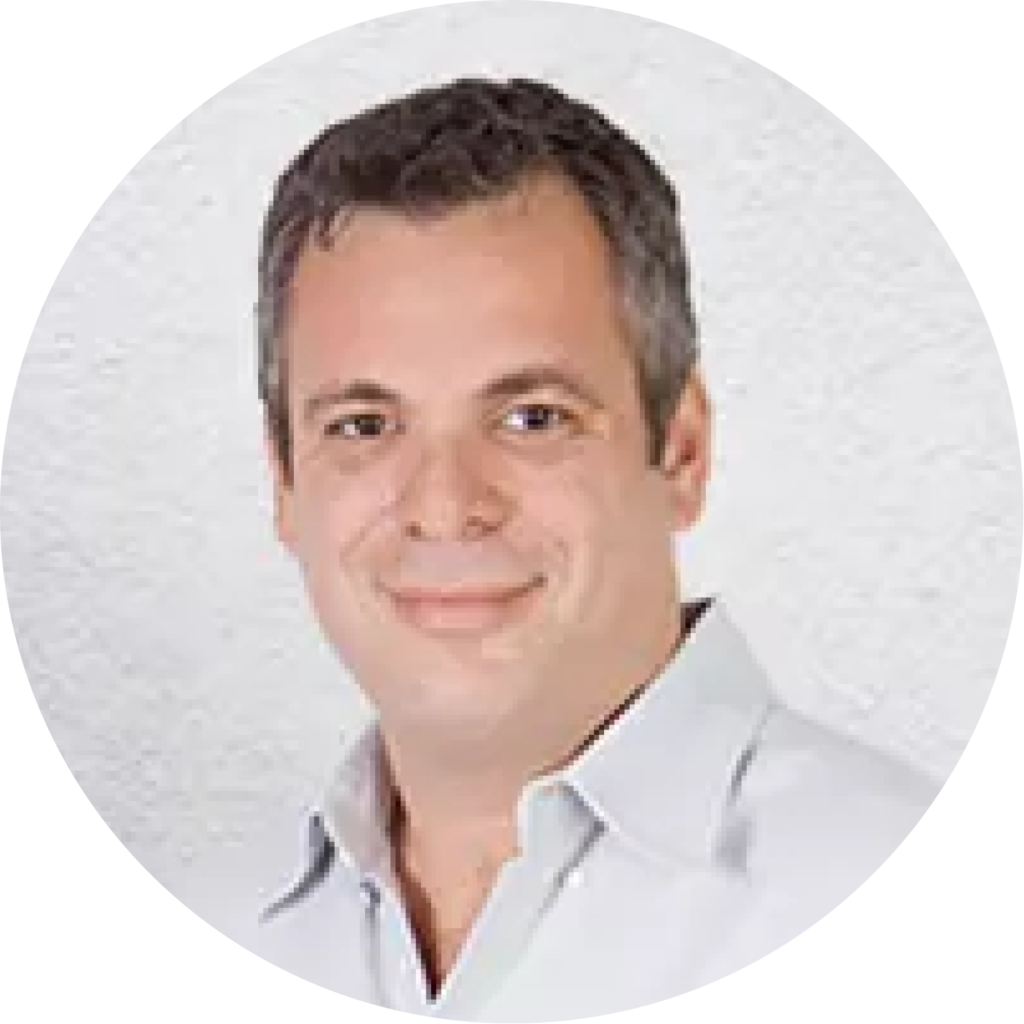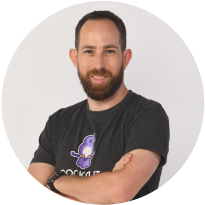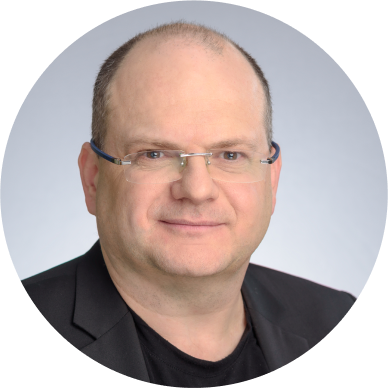1. What is a daily habit you love doing?
Every night I play on my PlayStation while listening to e-books on the Audible app. I don’t know if that counts as multitasking because the two activities activate different currents in the brain – it’s kind of like running and listening to music at the same time. This way I can both relax and go through a crazy amount of books. I have enough time to do this because I’m a night person – I go to bed at around 5:00 AM and get up at around 11:00 AM. I’ve been like this my whole life. Even when I served in the military, at some point they gave up and allowed me to arrive whenever I wanted, as long as I worked properly.
2. What piece of advice would you give yourself when you started? What advice would you ignore?
Over time I learned two very essential things: Firstly, how important it is to define the way you do something and to act by it no matter what. This means we create a thorough methodology about how work should be done, and whoever doesn’t follow it can’t work with us.
For example, we have some very clear principles about how we do marketing. Principles regarding branding, acquisition, how we publish content and how we measure ourselves (we use the TROI metric). You define each one of these really well, and then act upon it. At a certain point you understand that you can change or improve that methodology, but the fact that you have a good base allows you to take it a step forward.
Same goes for products. We have an organized methodology about how we want to build products here at Wix: We take some users and turn them into ambassadors. Then, we build a ‘tractor’ – we take all the functionality and put it in a pile of screens that explain what we intend to do with the product. Afterwards, we turn the screens into actual UX and we start developing them. This process creates a higher quality from the first step. The ‘tractor’ allows us to receive feedback from the beginning, and the process also gives us a lot of freedom and creativity in the UX design stage.
When we started Wix, Gig (Giora Kaplan, Wix Co-Founder & CTO) and I used to build screens. Although Gig is a better product man than myself, he felt the products I made were better. He sat down and analyzed the reasons for this, and he concluded that it was because I used a certain method. As soon as he started using a method, he was already much better than me. If I follow that insight, I can now use the method Gig built – which was better than mine – and be even better. But if each one would use a different process, none of us would have improved.
I read this piece of advice in a book by Ferran Soriano (Goal: The Ball Doesn’t Go In By Chance: Management Ideas from the World of Football), who recently joined our board of directors. I read the book a long time ago and didn’t realize how important this concept would be. The ability of an organization to create a way for itself, and have its employees loyal to that way absolutely, is what allows an organization to constantly grow and improve.
If you aren’t absolutely loyal to that method, then the company can go out of sync. At the beginning it’s not a problem because there are only five people in the company. When there are fifty people it becomes a problem, and when there are five hundred people it’s terrible. The way to reach excellence is to do things in a similar way across the organization. Everyone understands what the processes are, what the aspiration is, how to measure themselves and how to coordinate things with each other. This not only creates a shared language, but also a shared quality level to the whole organization and an ability to duplicate things that work well from place to place.
You can also see this in monday.com and Wix. A company needs to discover how it works and to stay loyal to it. There are a lot of similarities between monday.com and Wix, yet there are still significant differences. The monday.com ‘flavor’ is not the Wix ‘flavor’, and that’s what makes monday.com a terrific company in its own right. Even their CEO, in my opinion, is better than the CEO of Wix.
It’s hard for me to talk about a piece of advice that I would avoid because I believe everyone should do what fits them. Even though I don’t necessarily believe in following a traditional path in life, I’m still learning a lot from people who have done so. For example, when we went public, we first had to understand how to even do it. Usually, when you do an IPO you talk with a CEO or two beforehand. We spoke with fifteen. We interviewed them, heard what did and didn’t work for them, but all of their insights in tables and after that, we really felt prepared.
3. What piece of content (book/podcast/Ted Talk) is your favorite or has influenced your life?
Dune by Frank Herbert. I read it first in high school and have re-read it three times since. It’s a science-fiction epic that is not only an amazing story but also teaches you about countless themes – our relationship with the planet, political rivalry, principled leadership – you name it.
There are a few books that have affected me. The first one is a book about Bill Gates titled How the Web Was Won. It amazed me to learn how he views people and how much power he brings.
The second book is Up the Organization – a book by former Avis CEO, Robert Townsend. I really relate to his work method. I trust the employees at Wix, to the point where if an employee brings me a contract to look through, I don’t because I trust that employee to do it in the best way possible. If I can’t trust someone one hundred percent, I won’t work with them. The book talks about that way of thinking, and it really affected me.
The third book is No Rules Rules, a book written by Reed Hastings, CEO of Netflix, and another fantastic book is The Goal which talks about the industry as a whole, and managers in the high tech world who read it can take insights from it to our world.
The best movie I watched about management is called The Replacements – a dumb comedy movie about football, which, from my point of view, teaches an infinite amount of insights about management. There are complete sentences in the movie that we took and adopted into Wix.
4. What is the most valuable investment (time, money or energy etc.) that you’ve ever made?
I have gathered many smart and interesting people around me over the years, and that is the best investment I have ever made. You can always invest in companies, but real investment is in building relationships.
The second best investment I have ever made was learning how to program. At the age of 11 I stumbled upon a computer store and asked my dad to buy me a computer, and I haven’t stopped programming since.
5. Is there a quote, mantra or message you live your life by and that you resonate with? It can be someone else’s as well.
I believe a CEO should be a ‘brown belt’ in everything.
In ‘Mad World’ by Tears for Fears they sing “When people run in circles it’s a very mad world”. on a philosophical level, it’s a sentence that really affected me. I really view the world that way: People want to do and experience things, want their lives to change – but in the end they just get up and do the same thing every day. So how will anything change? They might read about change, but they never actually act upon it. That is something I have always found hard to understand.
It doesn’t really matter how good you are at what you are currently doing, what’s important is that you go and take the first step. If every morning you wake up and do the same things, your life would look the same. As soon as you try to take a step in the right direction – even if you do it poorly and you stumble on the way – your life has already changed. You are not who you were yesterday. And from now on, you can already improve.
We adopted this outlook into Wix. Every day I’m busy being a ‘brown belt’ at everything I should be as a CEO. As a company, if we continue doing the same things, I expect us to get the same results. So the point is to think how we can do things differently and how we can improve at what we’re doing. If we are doing something poorly, it’s still better than not doing it at all. We’ll improve later.
As a CEO, you do not need to be a ‘black belt’ or a super-expert, but you do need to understand enough in order to challenge the expert that is working with you. Your role as CEO is to build an excellent team, to communicate the goals to everyone in a very clear manner, and then to challenge them to do more things and do them better.
6. What helps you stay motivated on good and hard days?
As soon as I decide to do something – creating a company for example – that’s what motivates me. Ever since I can remember myself I knew I wanted to build a technology company. I never had to ask myself what I wanted to do when I grow up, so this was already something that really motivated me.
Beyond that, there are three additional things that motivate me: The first is the employees of the company. I love the employees at Wix and I really enjoy seeing how they enjoy their work. It’s amazing to see that we were able to create something like that. The second thing is the customers. In our world, I really see people whose lives were changed by our product, for real. One time, for example, we got a thank you letter from an entire village in Morocco. It is super touching.
The third thing is our vision. When we started Wix in 2007 we said something that sounded nuts to most people: we said we wouldn’t sell the company, and prove that you can build a large company, for private consumers, whose management is located in Israel. At the time there weren’t companies like that in Israel – the last company that went public before us was Mellanox. It was customary to build the company for an exit, and the management would almost always move to the US. When I went to raise capital as an Israeli and talked about those ambitions, people thought I was nuts.
That was a goal we set for ourselves and in my eyes, this is what will change the quality of life for all of us, more than anything else. In the end this is what will turn our country into a place with money, a place that has jobs, and interests, and a future. Today when I look at it, I tell myself that we did it. That is thanks to a number of companies that proved we can – companies like monday.com, Iron Source, Fiverr, Lemonade. Next year there will already be 15 companies in Israel worth over a billion dollars, that are completely independent, which is a great success for the country.
And alongside everything I said, I don’t believe in things that need to motivate me. You need to motivate yourself.
7. What are you passionate about other than managing your own company?
I’m one of these people who were born with a battery and a smile of joy. There are many things I enjoy: I have practiced martial arts all my life, I play on the PlayStation, I watch movies, I travel. I enjoy learning, sitting with friends, and laughing. It’s also easy for me to entertain myself. Until the age of 30, I never knew there was a concept called boredom – I don’t have time for that.
8. What have you recently thrown away or released from your life that made a positive impact and why?
I left a partner in a startup we started. He’s a brilliant man, but our work methods were very different and that took a lot of energy from me. That is something I feel I’ve let go of in my life. I learned that a partnership is like a relationship – it should be easy and fun.
Another thing I learned to let go of is other people’s expectations of me. The more successful Wix is, the more people have the feeling I owe them something, whether it’s how I work or what my political opinions are. I don’t pretend to understand anything about it. The way I contribute to the country is as an engineer – building products and companies, bringing in money for the country, and being part of the creation and success culture. I learned to completely let go of all the rest.
9. Share a failure you have experienced and what you learned from it.
One of the things I learned is that if people don’t have the same set of values and work beliefs as me, I can’t work with them. I worked with a group of people who tried very hard to show me how much they can work, and they tried to build very complicated things. My set of values is very different – I believe in building easy and practical things. I kept working with them for a relatively long period of time that was supposed to end much earlier in my opinion, because they just couldn’t create things I believed in on a strategic level. It sounds small, but if there isn’t an agreement on how to build things, it creates arguments and holds everyone up. This advice sounds theoretical but it’s very fundamental.
10. If you could have anyone in the world answer these questions who would it be and why?
The person I am most interested in hearing is Brad Silverberg. He developed the Mac and the Lisa (one of the first personal computers ever created), as well as other products such as Windows, Explorer and Office, among others. Until he quit, everything he touched already occupied one hundred percent of the market.
I managed to meet him twice, and those were the two most teaching meetings I’ve had in my life. He taught me a lesson in humility, and alongside that his strength of thought is something I haven’t been able to witness anywhere else.
*Want to read about another inspiring Founder? Click here to read about Tamar Schapira, Founder of Senseit.







